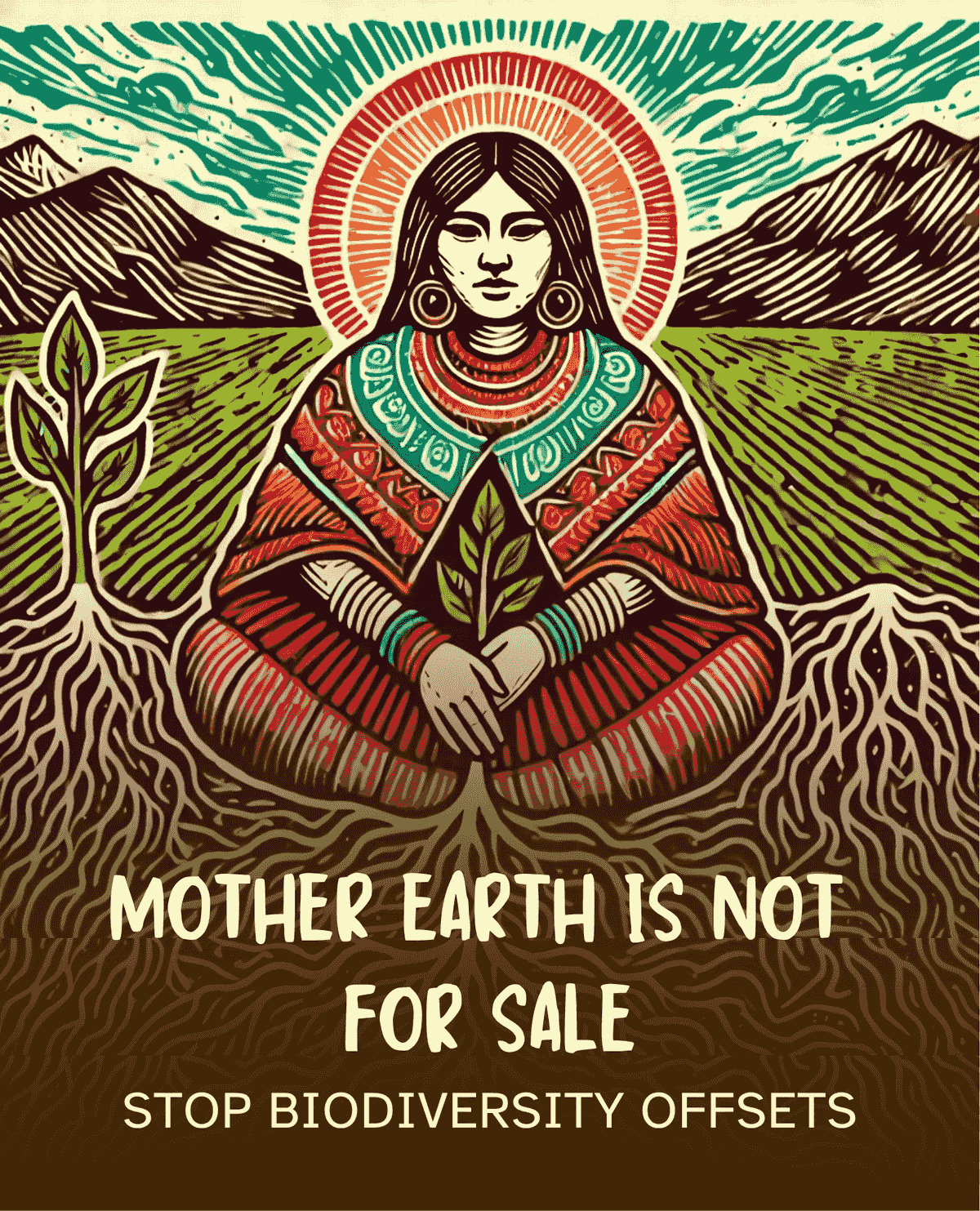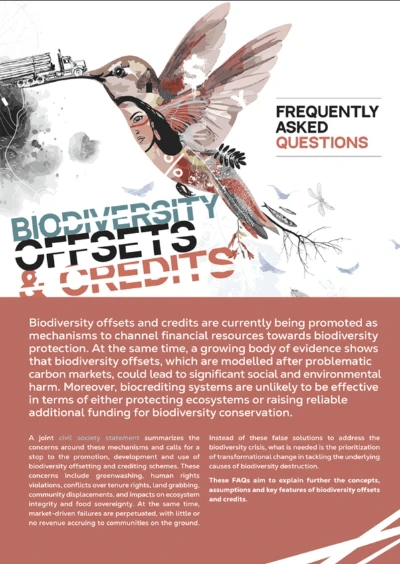biodmarketwatch.info

"Biodiversity markets run fundamentally in opposition to the cosmovisions of many Indigenous Peoples and other communities, who understand Nature as our mother, not as a commodity."
- CSOs Statement on Biodiversity Offsets and Credits
Unveiling the shortfalls of biodiversity markets
Biodiversity offsetting and crediting are fundamentally flawed market-based mechanisms that fail to address the root causes of biodiversity loss. Instead of preventing destruction, they normalize it by allowing companies to harm ecosystems as long as they pay to “compensate” elsewhere. By oversimplifying biodiversity complexity into tradable units, these schemes commodify nature, encourage continued exploitation, and prioritize corporate interests over ecological integrity.
Biodiversity offsets often undermine human rights, particularly those of Indigenous Peoples, peasants, local communities, and small-scale food producers. Many offset projects involve land grabbing, forced evictions, and restrictions on traditional land use, disproportionately harming communities that have historically protected biodiversity. Biodiversity markets also suffer from serious flaws -similar to the problems seen in carbon markets- such as difficulties in measuring ecosystem integrity, guaranteeing additionality, ensuring permanence, and preventing leakage.
We need to shift away from market-based mechanisms towards systemic change. This includes halting harmful financial flows that fund ecosystem destruction, phasing out perverse subsidies, cutting emissions, stopping deforestation, and supporting a just transition to sustainable food systems. It advocates for direct funding to Indigenous Peoples, local communities, and grassroots conservation initiatives that have proven track records of protecting biodiversity, rather than funneling resources into speculative markets that enable corporate greenwashing.
Recent publications

Biodiversity Offsets and Credits FAQs (October, 2025)
This document explains the answers to some of the most important questions regarding biodiversity offsets and credits, from what they are to why they are deeply problematic as tools for biodiversity protection. These approaches fundamentally misunderstand the uniqueness and complexity of ecosystems, making the idea of substituting one ecosystem for another scientifically unsound and ethically questionable. The report warns that biodiversity credits are likely to be used almost entirely for offsetting rather than voluntary conservation, echoing the failures of carbon markets. It also highlights that these markets benefit corporations, banks, and intermediaries while providing little benefit to local communities or Indigenous Peoples, and can lead to land grabbing, displacement, and conflicts over tenure rights. The FAQs critique the technical flaws of offset and credit systems while calling for alternative solutions that avoid the commodification of nature, like redirecting harmful subsidies, enforcing strong environmental regulations, and prioritizing grants and direct funding for Indigenous Peoples and community-led conservation initiatives.

50 Shades of Green: The New Markets for Nature, As Explained to My Grandmother (updated October, 2025)
Confused about what biodiversity credits and offsets are, and how they can supposedly protect and preserve nature? Enjoy this visually engaging and easy-to-understand comic to see how these "new markets for nature" actually work against biodiversity.

The Biodiversity Market Mirage (October, 2024)
Biodiversity is in crisis. Nature is being degraded and destroyed at a dizzying pace, and entire species are being eradicated as their habitats disappear. Over the past years, the obvious solution to stop destroying ecosystems and uphold the Rights of Indigenous Peoples has been overshadowed by various ploys to quantify and put a financial value on nature. In this report, presented at the opening of the UN Convention on Biological Diversity COP16 in Cali, Colombia, we take a closer look at biodiversity offsets and credits, which are part of the plethora of market-based schemes that are being presented as antidotes to the biodiversity crisis. Biodiversity offsets and credits promote and normalise the idea that the loss of biodiversity and nature in one area can be compensated for elsewhere. This report exposes the myriad of problems associated with these schemes, showing that they are yet another false ‘solution’ proposed by the beneficiaries of neoliberal economic monetisation and financialization.
Stop the promotion, development and use of biodiversity offsetting and crediting schemes. Instead, prioritize transformational change in tackling the underlying causes of biodiversity loss



